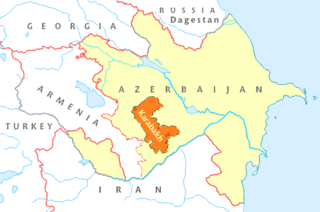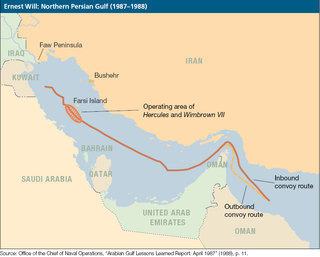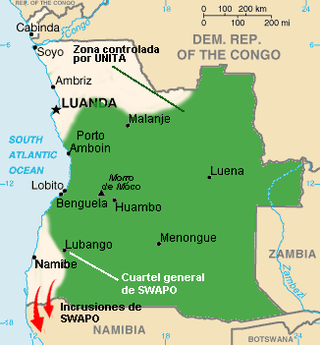
United Nations Security Council Resolution 687 was adopted on 3 April 1991. After reaffirming resolutions 660, 661, 662, 664, 665, 666, 667, 669, 670, 674, 677, 678 and 686 (1991), the Council set the terms, in a comprehensive resolution, with which Iraq was to comply after losing the Gulf War. Resolution 687 was passed by 12 votes to one (Cuba) against, with two abstentions from Ecuador and Yemen, after a very extended meeting. Iraq accepted the provisions of the resolution on 6 April 1991.

A ceasefire, also spelled cease-fire, is a stoppage of a war in which each side agrees with the other to suspend aggressive actions often due to mediation by a third party. Ceasefires may be between state actors or involve non-state actors.

United Nations Security Council Resolution 1680, adopted on May 17, 2006, after recalling previous resolutions on Lebanon, including 425 (1978), 426 (1978), 520 (1982), 1559 (2004) and 1655 (2005), the Council strongly encouraged Syria to respond positively to Lebanon's request to delineate borders and establish diplomatic relations, with the purpose of asserting Lebanon's sovereignty, territorial integrity and political independence.

The United Nations Iran–Iraq Military Observer Group (UNIIMOG) was a United Nations commission created during the Iran–Iraq War by the United Nations Security Council in Resolution 619 of August 9, 1988. The withdrawal of UNIIMOG forces in 1991 marked the official end to the Iran–Iraq War.

United Nations Security Council resolution 874, adopted unanimously on 14 October 1993, reaffirmed sovereignty and territorial integrity of the Azerbaijani Republic and of all other States in the region, called for the preservation of the ceasefire, cessation of hostilities and withdrawal of forces from recently occupied districts of the Republic of Azerbaijan, and reaffirmed resolutions 822 (1993) and 853 (1993). The Council expressed its concern at "...the conflict in and around the Nagorny Karabakh region of the Azerbaijani Republic, and of the tensions between the Republic of Armenia and the Azerbaijani Republic...", and called upon the parties to observe the ceasefire agreed with by the government of Russia and OSCE Minsk Group.

United Nations Security Council resolution 884, adopted unanimously on 12 November 1993, after reaffirming resolutions 822 (1993), 853 (1993) and 874 (1993), the Council expressed its concern at the continuing conflict between Armenia and Azerbaijan in Nagorno-Karabakh and condemned violations of the ceasefire between the parties, particularly the occupation of the Zəngilan district and city of Goradiz. Resolution 884 is the fourth and last of the resolutions adopted by the UN Security Council regarding the Nagorno-Karabakh conflict.

United Nations Security Council resolution 479, adopted unanimously on 28 September 1980, after reminding Member States against the use of threats and force in their international relations, the Council called upon Iran and Iraq to immediately cease any further uses of force and instead settle their dispute through negotiations.

United Nations Security Council resolution 514, adopted unanimously on 12 July 1982, after recalling Resolution 479 (1980) and noting the mediation efforts by the Secretary-General, Organisation of the Islamic Conference and the Non-Aligned Movement, the council expressed its deep concern at the prolonged conflict between Iran and Iraq.

United Nations Security Council resolution 540, adopted on 31 October 1983, noting the report of the Secretary-General and the increased cooperation from the governments of Iran and Iraq, the Council requested he continue with the mediation efforts in the region.

United Nations Security Council resolution 552, adopted on 1 June 1984, after hearing complaints from Bahrain, Kuwait, Oman, Qatar, Saudi Arabia and the United Arab Emirates regarding attacks on their ships by Iran, the Council condemned the attacks, reiterating that Member States should refrain from using threats or use of force in their international relations.

United Nations Security Council resolution 582, adopted unanimously on 24 February 1986, after noting that the council had been seized for six years and the continued conflict between Iran and Iraq, the council deplored the initial acts that started the Iran–Iraq War and continuation of the conflict.

United Nations Security Council Resolution 588, adopted unanimously on 8 October 1986, after expressing concern at the continuation of the conflict between Iran and Iraq, the Council urged both countries to implement Resolution 582 (1986) without delay.

United Nations Security Council resolution 598 S/RES/0598 (1987), adopted unanimously on 20 July 1987, after recalling Resolution 582 and 588, called for an immediate ceasefire between Iran and Iraq and the repatriation of prisoners of war, and for both sides to withdraw to the international border. The resolution requested Secretary-General Javier Pérez de Cuéllar to dispatch a team of observers to monitor the ceasefire while a permanent settlement was reached to end the conflict.

United Nations Security Council Resolution 612 was adopted unanimously on 9 May 1988. After considering a report by the Special Mission that was dispatched by the Secretary-General to investigate the alleged chemical warfare that had been occurring in the Iran–Iraq War, the council confirmed the use of chemical weapons and issued a condemnation on the grounds that the usage of these weapons ran contrary to states' obligations under the Geneva Protocol.

United Nations Security Council resolution 616, adopted unanimously on 20 July 1988, after hearing representations from the Islamic Republic of Iran, the Council expressed its distress at the downing of Iran Air Flight 655 over the Strait of Hormuz by a missile from the United States Navy cruiser USS Vincennes during the conflict between Iran and Iraq.

United Nations Security Council resolution 619 was a resolution adopted unanimously on 9 August 1988 by the United Nations. The resolution came after recalling Resolution 598 (1987) and approving a report by the Secretary-General Javier Pérez de Cuéllar on the implementation of paragraph 2 of Resolution 598.

United Nations Security Council resolution 620, adopted unanimously on 26 August 1988, after recalling Resolution 612 (1988) which found evidence of the use of chemical warfare between Iran and Iraq, the Council again condemned the use of such weapons, in violation of the Geneva Protocol.

United Nations Security Council resolution 851, adopted unanimously on 15 July 1993, after reaffirming resolutions 696 (1991), 747 (1992), 785 (1992), 793 (1992), 804 (1993), 811 (1993), 823 (1993) and 834 (1993), the Council noted the continuing deterioration of the situation in Angola and extended the mandate of the United Nations Angola Verification Mission II until 15 September 1993, discussing further the peace process in the country.

United Nations Security Council resolution 994, adopted unanimously on 17 May 1995, after reaffirming all resolutions on the conflicts in the former Yugoslavia, particularly resolutions 981 (1995), 982 (1995) and 990 (1995), the Council discussed the withdrawal of Croatian Army from the zone of separation taken in Operation Flash on May 1st and the full deployment of the United Nations Confidence Restoration Operation in Croatia (UNCRO).














